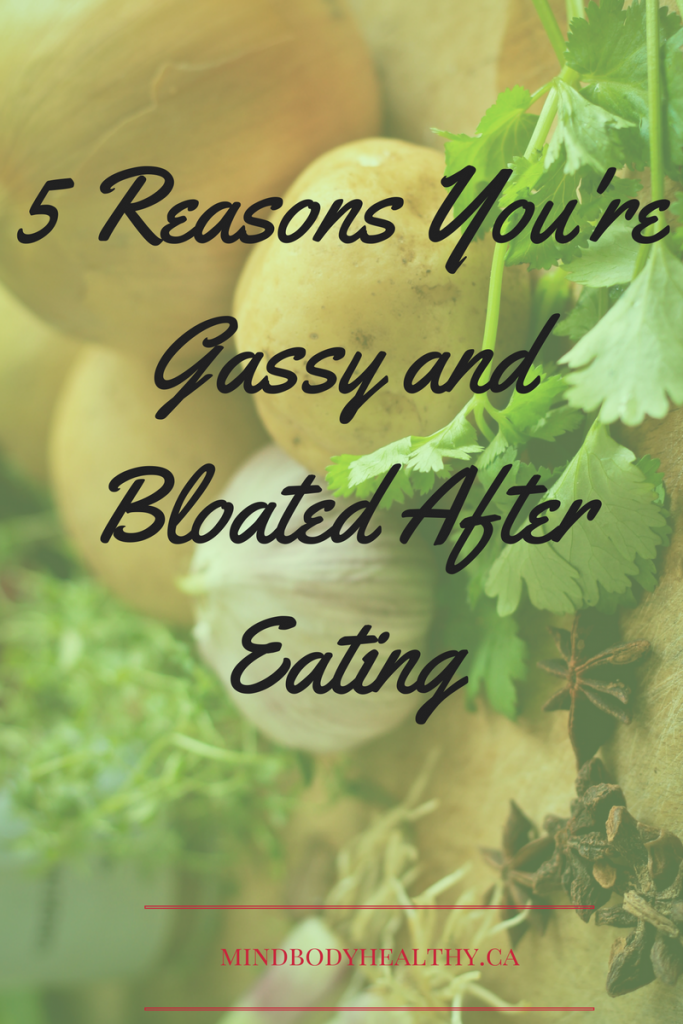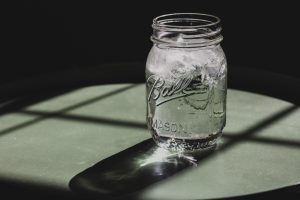5 Reasons You’re Gassy and Bloated After Eating
One of the most annoying things about mealtime is never knowing if you will be gassy and bloated after eating! (Believe me, I know ALL about this!) Have you ever felt hesitant to eat out with friends or at work because you know there’s a good chance your stomach may deceive you?
Feeling gassy and bloated after eating is embarrassing, not to mention painful, disruptive and irritating. And, for people with health issues like irritable bowel syndrome or celiac disease, mealtime can be absolutely awful!
Why are you so gassy and bloated after eating?
There’s really more to this story than a few foods that disagree with you. Feeling gassy and bloated after eating could indicate a few problems doing on in your digestive tract:
- Low stomach acid
- Too much bad bacteria in the gut
- Constipation or slow transit time
What does this mean?
Low stomach acid is exactly what it sounds like – your stomach doesn’t produce enough hydrochloric acid to properly digest the foods you eat. When your stomach acid is low, undigested foods enter the intestinal tract only partially digested and your gut is expected to break these down.
Not good!
Undigested foods particles interact with bad gut bacteria and begin to ferment. Carbohydrates and proteins are especially susceptible to this problem. Aside from fermentation (which is what causes gas and bloating after eating), undigested proteins irritate your intestinal wall and promote allergic reactions throughout your body.
And, the longer food and waste stays in your intestines and colon, the more opportunity is has to ferment, causing more gas and bloating! There’s also more opportunity for toxins in the colon to be reabsorbed into the body. Ouch!
Why These Things Happen To You
Feeling gassy and bloated after eating is never a good time, is it? People believe that specific foods are what causes their gas and bloating but it’s really related to the state of their digestive tract. Heal your digestive tract and foods won’t cause you to feel gassy and bloated after eating!
There are some pretty simple reasons that your digestive tract has gone haywire.
#1 – You eat too fast
If you eat your meal too fast, food isn’t broken down very well by the time it hits the stomach. Your stomach works really hard, secreting lots of HCL, but it isn’t able to do its job fully. The stomach can’t just keep churning forever so slowly undigested food particles get released into the intestines.
Action: Slow down! Take your time when you eat your meals. Savor them, enjoy them and love the taste and texture. Put your utensils down between each bite and chew every morsel 30-40 times to really break down that food! (This is especially important for proteins and high glycemic load carbohydrates.)
#2 – You eat too much
A large meal depletes your stomach’s ability to produce stomach acid; it gets fatigued and can’t breakdown food as well as it once did. Even if you eat a smaller meal occasionally, your stomach may still be unable to produce enough acid to properly digest your food.
Action: Eat less food! This can be tough to get used to, especially if you’ve been eating three large meals per day. When I say to eat less food, I mean try not to eat an entire medium pizza in one sitting! Opt for more veggies instead of two burgers. It’s the protein that you eat that is most detrimental to your stomach acid. It takes a lot of acid to breakdown protein.
Try to avoid eating while distracted, like eating at your desk! Measure your food portions out or use a smaller plate. Tell yourself that you’ll only have one burger for dinner and stick to the plan!
#3 – You drink too much with meals
For as long as I can remember, I never wanted to drink while I ate; I don’t know where this came from because I grew up with a glass of milk or water in front of me at every meal. Having something to drink at meals is very common, and many people only drink with meals. However, this practice can quickly dilute your stomach acid. Diluted acid doesn’t breakdown foods so most of your meal moves onto the intestines only partially digested (see above).
Action: Take small sips of water with meals. Instead of gulping down a glass or two of water during dinner, try taking only small sips of water with your meals. Avoid drinking too much within 30 minutes of eating and stay away from large quantities of fluid for 2-4 hours after your meal; the more food you eat, the longer you should let your stomach do its thing before risking the dilution factor.
#4 – You don’t eat enough fibre
Fibre is incredibly important for both intestinal health and normal transit time. Both insoluble and soluble fibre helps to feed your good bacteria, helping it grow and thrive. Fibre also bulks up the stool, making it easier to pass. And some fiber helps absorb toxins from the intestinal tract and sweep them out via elimination. So, you need to eat your fiber!
Action: Eat more fibre! At its most basic level, you need to eat more fruits and vegetables. Eat 2 or 3 servings of low glycemic load vegetables at every meal, including breakfast. Have 1 apple every day along with 1 cup of fresh or frozen blueberries. And add 1 tablespoon of ground flaxseed to your daily diet too!
#5 – You don’t drink enough water
While too much water with meals isn’t good, not drinking enough water is really bad for your gut health. Water flushes out toxins and is needed to bulk up the stool. A healthy stool is one that’s not too dry and lumpy (find out if your poop is normal!). If you’re dehydrated, your body will absorb water from your stool, leading to constipation and reabsorption of toxins! Yuck!
Action: Drink more water! So many people struggle with this one! I recommend that you aim for at least 3 liters of pure, filtered water every day. I know this can be tough, especially if you don’t like water or you’re used to only a couple of glasses a day.
But trust me – your body will love you! So many good things happen when you drink enough water but today we are just focusing on eliminating constipation (because it’s very dangerous – chronic constipation is a risk factor in colon cancer).
So, here’s my advice. One, buy a 1 liter BPA-free bottle and drink 1 liter before lunch and 1 liter between lunch and bedtime, to start. Or, buy a 2 liter BPA-free or glass bottle, fill it up with water and put it in the fridge; finish this bottle off every day. It’s easier for me to keep track of how much I drink if I use larger containers; it’s tough to keep track of actual 250 ml glasses! In my opinion, anyway.
And, a little trick you can start doing right away – drink 2 glasses of water as soon as you wake up. You will almost always wake up a little bit dehydrated so this water will get things moving again and help hydrate your cells.
A Little Bit More Help
If you are serious about fixing your gas and bloating after eating, there are some more things you can easily try.
Eat more fermented foods.
Foods like dairy-free yogurt, kombucha, miso, sauerkraut or sugar-free pickles have natural strains of good bacteria in them that help rebuild your gut’s bacterial balance. At the same time, fiber will then help to feed those natural strains to help keep them active and healthy.
Avoid eating high glycemic foods with protein.
Contrary to what we’ve all been taught, meat and potatoes do NOT go together! High glycemic load foods, like white potatoes, whole grains, rice and some squash, are high in glucose, which kills your good bacteria. These foods also digest much faster than protein so, while your body is busy breaking down protein, these carbs start to ferment in your gut, causing, you guess it, gas and bloating!
Digestive Enzymes
For really weak stomachs, and to reduces feeling gassy and bloated after eating, supplemental digestive enzymes can help replenish those natural enzymes that have been depleted from eating too much food. Digestive enzymes can be especially helpful before meals that you know will leave you gassy and bloated after eating them. Digestive enzymes aren’t something to take long-term, nor are they created equal, so make sure you speak with your health coach before testing these out.
If you’ve had your gallbladder removed, though, you probably should be taking digestive enzymes that contain ox bile with most of your meals. Your body still has the ability to produce bile but nowhere to store it so you likely can’t digest fats very well. Ox bile will help with this.
Try Apple Cider Vinegar
One tablespoon of apple cider vinegar in a glass of water 5-10 minutes before each meal is one simple step that has totally turned around my digestive experience! The vinegar helps stimulate hydrochloric acid production so your stomach is ready to combat the food you’re about to enjoy. This one trick is likely the quickest way to eliminate feeling gassy and bloated after eating, in my experience!
Manage Your Stress Levels
Ah, the one piece of advice that I feel like I am ALWAYS giving you! Well, it’s important, and it’s something I need to do more of myself! When you’re stressed, your digestion shuts down – you don’t really need to be digesting a meal if you’re running away from a knife-wielding maniac, right?
Even if your day is hectic and you can’t seem to get a handle on your stress, at least dedicate 10 minutes before each meal to do some deep breathing, think calming thoughts or say some affirmations. Remember – your stomach acid is vital to overall health. Without adequate stomach acid, everything else kind of goes to, well, you know…
Take Action
Pay attention to what you’re eating and how you’re feeling for each meal and you’ll soon start to see patterns. I highly recommend that you start tracking both your food and your symptoms and be consistent for 3-4 weeks. Really pay attention to when you feel gassy and bloated after eating certain meals or foods.
If you try any of my recommendations, make a note of when you do each so that you can see how the recommendation is helping you (or not, everyone is different).
To get you started, here’s a weekly food and symptom tracker that you can download and print off. Keep it in your purse or bag so that you can write everything down as it comes up. And don’t forget a pen!
Good luck! If any interesting patterns do emerge, email me with any questions or even ‘aha’ moments in this process! I’m always curious about how my tribe is doing!
References:
https://authoritynutrition.com/13-foods-that-cause-bloating/
https://authoritynutrition.com/11-proven-ways-to-reduce-bloating/
https://authoritynutrition.com/foods-high-in-fodmaps/
https://authoritynutrition.com/fiber-and-constipation-truth/
http://www.webmd.com/heartburn-gerd/gas-burping-or-bloating-that-begins-after-eating-or-drinking





